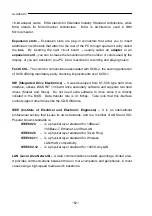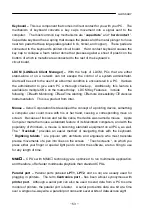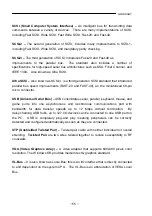
GLOSSARY
~54~
parallel wires simultaneously. Take note that a serial connection sends a single bit, a
parallel port send an entire byte.
PCI Bus (Peripheral Component Interconnect) –
It is a connection slot in a
motherboard that supports 32-bit bus transfer rates. The now standard PCI Local Bus
carries data along at least 32 lines, that is, at least 32 bits at a time. Local bus
computer designs add special buses so the CPU can communicate directly with key
components like the monitor, resulting in much better performance. You should look for
PCI local bus capabilities in any system you buy, especially PCI local bus video (which
helps the monitor display more quickly).
POST (Power-On Self-Test) –
is the first thing your PC does when you turn it on, and
it’s your first warning of trouble with any of the components. When the POST detects
an error from the display, memory, keyboard, or other basic components, it produces an
error warning in the form of a message on your display and — in case your display is part
of the problem — in the form of a series of beeps.
RAM (Random Access Memory) –
consists of a bank of chips that act as “ working
memory ”, holding program instructions and data only while your computer’s on. Unless
the instructions and data are saved to a disk, RAM forgets them when you turn your
computer off. RAM is measured in megabytes (M). Most computers today come with
64M of RAM, though some sell with only 32M installed. There are a few different types
and speeds of RAM, as well. One of the most prominent today is Extended Data
Output ( EDO ) RAM, but an even faster type of RAM that has just hit the market is called
SyncDRAM
.
Serial port –
Serial ports are also sometimes called
COM
(short for COMmunications)
ports, and are labeled
COM1
,
COM2
, and so on. It is simple in concept: one line to
send data, another line to receive data, and a few other lines to regulate how data is sent
over the other two lines – uses range from commonplace modems and printers to
plotters and burglar alarms. The most common use for serial port is with a
mouse
or
modem
. The reason for this is that a serial port is not a very efficient way to transfer
data, so little data that speed is not crucial, and perfect for modems because, with
current technology, phone lines cannot transport more than one signal at a time anyway.
The
serial port
is often referred to as an
RS-232 port
.






















